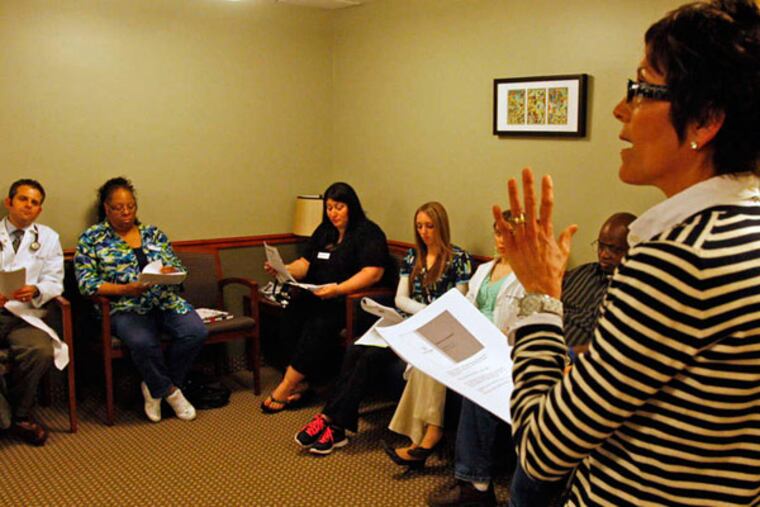The doctor will see you now - in a group
Eating healthy is something Marian McMullan tries to do. She is used to parsing food labels loaded with calories, carbs, sugars, and serving sizes. But there's one thing McMullan has never understood: dietary fiber.

Eating healthy is something Marian McMullan tries to do. She is used to parsing food labels loaded with calories, carbs, sugars, and serving sizes. But there's one thing McMullan has never understood: dietary fiber.
When the topic came up at a Bryn Mawr Family Practice group medical appointment, McMullan jumped in to ask registered dietitian Judy Matusky to break the code. How many grams does a person need every day? McMullan asked.
Matusky told the nine strangers in the room, done in soothing green tones, that a person needs 25 grams of dietary fiber daily. Half of Americans fall short of that.
One way to help reach that number, Matusky said, is to eat whole grains at least three times a day. That was fine, McMullan persisted, but what do a few grams of dietary fiber look like? The answer: One slice of whole-grain bread packs two to three grams of dietary fiber. Other good fiber sources include split peas, beans, and raspberries.
"I had to ask that question because I was totally hung up on it," McMullan said. "I have a vested interest in learning more."
Most people have probably never heard of group appointments and may recoil at the idea of meeting en masse with their doctor, nurse, social worker, or other professionals.
Relax. No one expects you to delve into personal medical issues before a group. In fact, you don't have to say a word. All you have to do is listen and learn.
"This is an added service to help support what is going on in the examination room," said physician Seth Rubin, part of the Bryn Mawr team. "It is not meant or designed to replace the one-on-one visit."
It may seem novel, but the trend is growing. The American Academy of Family Physicians found that 12.7 percent of family physicians held group visits in 2010, up from 5.7 percent in 2005.
Some experts think that group appointments could accelerate, and help ease the doctor shortage expected as more people gain health insurance starting early next year under the Affordable Care Act.
The idea behind group appointments is to give patients the tools to become their own advocates and full-fledged partners with doctors. The groups also enable physicians to treat more patients, see them more often, and practice a more personal and rewarding style of medicine.
"This is the way medicine should be," said social worker Joanne B. Glusman, part of the Broomall-based Bryn Mawr Family Practice team. "It's really the right way to practice."
Groups aren't new or even the latest innovation. The first one dates back more than 100 years. In her book Group Medical Appointments, DeeAnn Schmucker credits Joseph H. Pratt, an internist at Boston's Massachusetts General Hospital, with conducting the first group meeting at the turn of the 20th century for discharged tuberculosis patients.
"The clearest data is that group medical appointments improve people's knowledge and their ability to understand what they need" said Rubin. ". . . People who know more about their disease are able to better help themselves."
Bryn Mawr Family Practice adopted the group model about 18 months ago, said physician Joseph A. Greco, the program's director. Getting the program going involved everyone from secretaries to medical residents.
"We educated ourselves and set up a multidisciplinary group and said, how do we change the work flow and share patient care," said Greco. "We had to change the tire while going down the road."
Most groups focus on specific diseases or chronic illnesses like high blood pressure, diabetes, or arthritis. And that is how Greco and his team began. But over time, they have refined their appointments to cover topics that appealed to more patients while still including chronic problems like diabetes and blood pressure.
April's meeting, for instance, was about numbers, from blood pressure to body mass index. May's was focused on nutrition - counting calories and grams of sugar and the benefits of organic vs. nonorganic foods. (Not much different nutritionally; wash both thoroughly)
"We constantly find out from the group what tools they need," Glusman said. "The goal is to meet our patients' needs."
Patients must sign up for each session and pay their insurance co-pay. If someone registers but doesn't attend, a staff member will follow up with the patient.
Before the 90-minute session begins, each participant has a one-on-one visit with a nurse or doctor in which vital signs can be checked and patients assessed to ensure that they have no acute issues.
The main goal of each session is education. But patients also enjoy support and camaraderie from one other.
"It's being together with someone else who has your problem or who may be at a different part of the spectrum than you," Rubin said. "It's being there with someone who can understand what you are going through."
Jacqueline Reid, who attended the May appointment, appreciated knowing that she wasn't alone in trying to eat right. A diabetic, Reid struggles to keep her sugar levels in control and is so conscientious about reading labels that she says no one will go food shopping with her.
"I'm trying to figure out good things to eat," Reid said. "It's not easy and takes a lot of effort on my part. You think you're doing OK but you're not. It is nice to see that there are other people struggling and that I am not the only one."
May's group session wasn't Reid's first, and she intends to continue attending.
"I always get what I expected," Reid said. "I definitely would tell people to come. If you want to be enlightened about something, you have to go to these sessions. Whatever they have to offer, my ears are open."